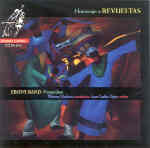Fans of this endlessly fascinating composer can never get enough, and happily this disc offers what by any standard amounts to the perfect Revueltas “fix”. In addition to outstanding performances of the chamber version of Sensemayá and of favorites (relatively speaking, of course) such as Hommaje a Frederico García Lorca and Ocho por radio, the Ebony Band offers three premieres. Hora de Junio is a conflation of spoken texts, original music, and additions from The Night of the Mayas alongside other bits by José Ives Limantour, who edited for performance some of Revueltas’ incomplete fragments. The three poems, by Carlos Pellicer, principally concern sadness and loss, and they are potently declaimed by Juan Carlos Tajes. Even though I usually dislike the combination of music and spoken voice, Revueltas’ own pungent idiom more than holds its own, and the result is curiously compelling.
Este era un rey, composed around 1940, was one of the last projects on which Revueltas worked before his untimely death in that year. It’s a tiny (five and a half minutes) but colorful suite of incidental music completely characteristic of him, as is the spiky Pieza para doce instrumentos (1929), four brief movements that apparently were never performed in his lifetime, and so never received a formal title. As to the rest of the program, the Ebony band does as superb a job capturing the desolation of Caminando as it does the vibrant Stravinskian rhythmic games of Planos. The ensemble’s aptly zany romp through the cartoonish El renacuajo paseador (“The Wandering Tadpole”) is particularly gleeful. Lastly, there’s a very interesting bonus in the form of José Pomar’s percussive Preludio y Fuga rítmicos. Pomar was a colleague of Revueltas in the 1930s, and certainly shared the same aesthetic inclinations. The piece is greatly entertaining, with some very creative use of simple harmonies in unexpected contexts.
Recorded live before a very well-behaved audience, Channel Classics’ multichannel production defines the best in SACD technology, offering exceptional clarity and giving a tactile presence to the players without excessive emphasis coming from the rear. The percussion section sparkles, while contributions of the less assertive instruments (solo strings and harp) register naturally, in excellent balance. This outstanding and unusually interesting disc is one that the composer’s many admirers should find irresistible–and it’s also an excellent way to get to know Revueltas generally. [1/3/2005]
































